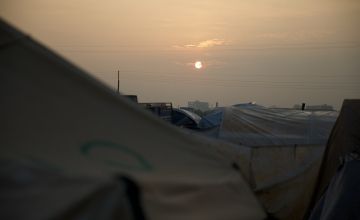
Read our 2024 annual report

Knowledge Hub
As conflict in Syria enters its 14th year, Concern urges Irish public not to forget the Syrian people.

Concern Worldwide has warned that cuts in funding to support Syrian people, marking 13 years of conflict today (15th March), are having a devastating impact on people’s lives and health.
Syria is the world’s largest refugee and internal displacement crisis. Approximately 16.7 million people in Syria – more than 70% of the population – require humanitarian assistance to access food, clean water, shelter, and hygiene facilities.
“The world has largely forgotten about Syria as it doesn’t see what is happening in the country. But once you come into Syria and you see the needs, that's when it really hits you,” said Faryal Minhas, country director for Syria and Iraq with the Irish humanitarian organisation.
“The needs are huge and are increasing, there is support but there is not enough. Unless there is a political solution, the humanitarian assistance needs to go on. Even though there are many other disasters in the world that need donor and public support, please don't forget Syria.”
Over 90% of Syrians now live below the international poverty line. Prior to the start of the conflict in 2011 this figure was as low as 10%.
Almost 6.5 million people have left Syria and are registered as refugees, while 5.5 million have been forced from their homes, often multiple times, but are still living within the country. Over 2 million now live in informal settlements, with services such as toilets and shower facilities, clean water, and education difficult to access.
In the north-east of Syria where Concern works, the Euphrates River has been a source of water for communities but in recent years it has experienced unprecedented low water levels, and below average rainfall which has resulted in a water crisis, putting people’s health at risk.
“ Organisations like Concern build latrines and toilets, provide water trucking to those informal settlements and importantly also to health centres. Without this, there will be continued outbreaks of diseases like cholera. And then with the lowering levels of the river, this has had a huge impact on the availability of water,” said Ms Minhas.
She added that pressure and cuts to funding might see an end to those life-saving supports.
“Water trucking is a very important intervention which needs to continue, and it needs to be done on a very regular basis.”
Add to this the impact on communities in north-west Syria of the earthquakes of 6 February 2023, the worst natural disaster in a century to hit the region. 8.8 million people were affected, among them 3.7 million children, where along with the devastating loss of lives, thousands of homes were destroyed.
Concern Worldwide has been responding to the crisis in Syria since 2013. Last year, our programmes in the country’s northeastern region reached almost 290,000 extremely vulnerable people with food vouchers, temporary employment, and small business grants (as well as other interventions). We also addressed problems of access to safe, affordable, and reliable supplies of water by rehabilitating six water stations and eight water networks—which support a total of 204,000 people.
Additionally in 2023, Concern responded within hours to the February 6 earthquake that devastated parts of Syria and Türkiye, distributing emergency supplies, and providing psychosocial support. One year later, we continue to work with these communities in northwestern Syria on the long-term recovery efforts.
Outside of Syria, our work in Türkiye, Lebanon, and Iraq is focused on working with both Syrians and local people in host communities.
For further information contact Eilis Staunton, Media Relations Officer, Concern Worldwide, at eilis.staunton@concern.net or 085 872 0720.
Other ways to help
Corporate support
Is your company interested in working together for a common cause?
Fundraise for Concern
From mountain trekking to marathon running, cake sales to table quizzes, there are lots of ways you can support our work.
Buy a gift
With an extensive range of alternative gifts, we have something to suit everybody.
Leave a gift in your will
Leave the world a better place with a life-changing legacy.
Volunteer with Concern
The lots of ways to get involved with our work as a volunteer
School fundraising
Without the generous support from schools, we wouldn't be able to do the work that we do.

